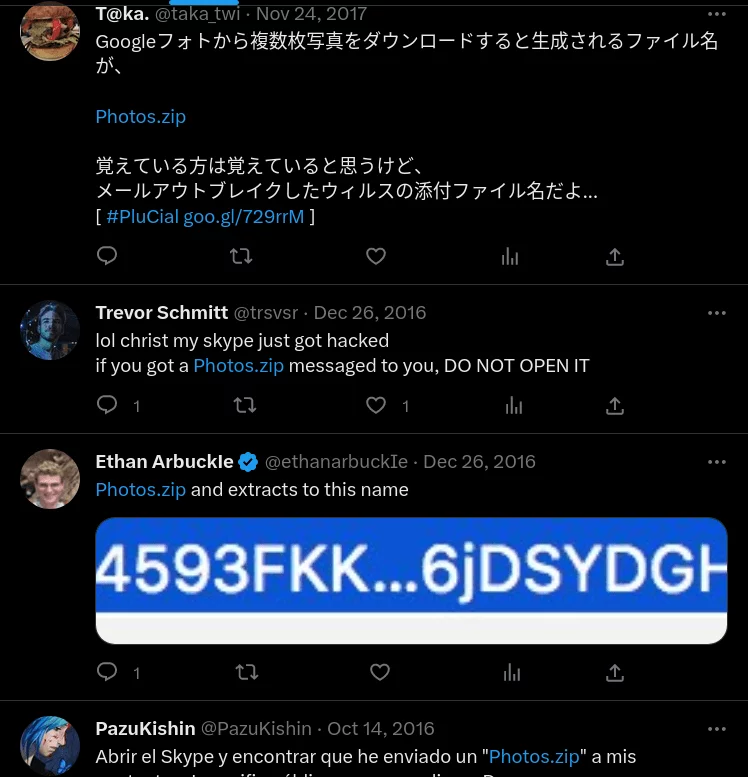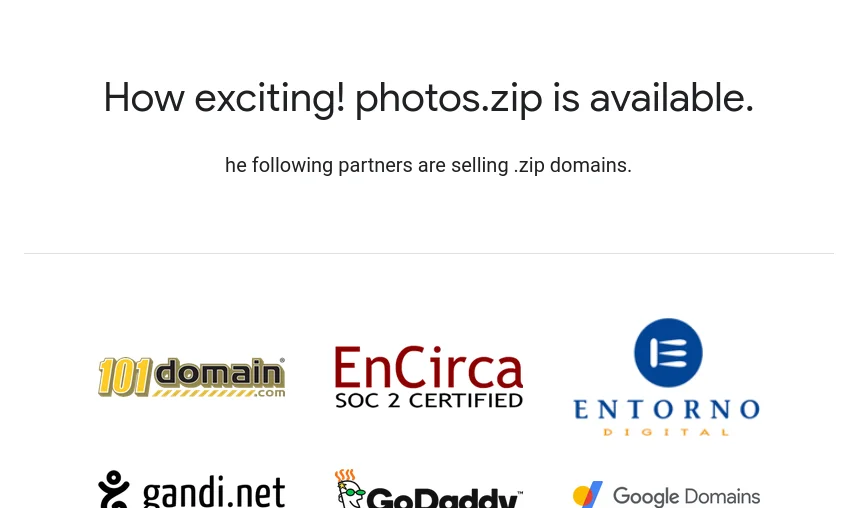The new .zip TLD is going to cause some problems
Many years ago, Google applied for the .zip Top Level Domain. ICANN, in its infinite wisdom, granted it. And now, I think, bad things are going to happen.
You see computers try to be helpful. They see you wrote "visit example.com" and autolink the thing which looks like a domain name. That's handy - especially as most people don't have the time or skill to write HTML.
So what happens when things which are not domain names look like they are domain names? I've been worrying about this for a few years:


Right now there is an old tweet, blog, email, or instant message from an authority figure which points to a non-existent .zip domain.

Is that domain available to buy? Well, let's look at Google's Domain Availability site

(No, I don't know where the missing "T" is either.)
Yup! OK, premium domains like photos.zip appear to be about £1,000 - which should put off some scammers. But the price for non-premium .zips is between £10-£30.
Look, I doubt a former president ever Tweeted "Hey, anyone know how I extract files from something called blah.zip on a Mac?" but I'll bet you that something, somewhere, is going to be abused with this new TLD.
I feel like a curmudgeonly old fart. Don't we have enough TLDs? What's the limit? There are very few meaningful controls on who can register all but the most retrictive TLDs (looking at you, .int!) So at what point do we just give up and same everyone can have their own Top Level?
Anyway, have fun determining if the link you see was ever intended to link to a website!
Mike says:
Offering .zip as a TLD seems both unnecessary and unwise. I wonder if anyone argued against creation of .com as TLD in 1985 due to clash with a filename extension https://en.wikipedia.org/wiki/COM_file
I wondered what reasons the proposal for making .zip a TLD gave for why it should exist. "The proposed gTLD will provide the marketplace with direct association to the term, ʺzip,ʺ which is often colloquially used to refer to a zip drive, a device used for digital storage. The mission of the proposed gTLD, .zip, is to provide a dedicated domain space in which registrants can enact second-level domains that relate to digital storage offerings and information or provide storage or other services. " The proposal was made in September 2014, so quite a lot closer to the time when Zip drives were at the peak of their really very limited popularity to now , but still far enough away from that peak to seem a weird reference to make to try to justify a TLD. The link between a briefly not very popular physical storage medium made by one company and digital storage offerings seems barely even tenuous. I assume the proposal was written in a room with a very large sign saying "Do not mention the extremely commonly used fileformat". https://icannwiki.org/index.php?title=.zip
Bookmark: shkspr.mobi/blog/2023/05/t...
@Edent Isn't the "problem" that browsers use the same field for search terms and URLs? TLDs and file extensions are different namespaces and shouldn't have to worry about conflicts.
Vince Medlock says:
This makes sense to me. As someone who loathes searching in the URL field, maybe this heralds a return of the Search field.
Browsers shouldn’t be confused because they inherently know what is linked to arbitrary text due to the underlying HTML. Word processors that try to be helpful by replacing what you typed with what they think you really meant will be in trouble, perhaps. But a simple switch to turn off that behavior will solve the problem.
Humans who can’t see the code behind the bright blue underlined text, however… they might struggle with this.
Jon Ribbens says:
"So at what point do we just give up and same everyone can have their own Top Level?" The answer is "we already did, 10 years ago" when ICANN decided people can register "Brand TLDs" (e.g. .apple, .barclays, .calvinklein, etc). By "people" I of course mean "corporations or the super-rich", but it's not like that makes it better.
(There's also been a ".mov" TLD since 2014, which has similar issues to .zip only not quite as bad.)
Travor Lewis Davidson says:
I really don't see the point of all those TLDs, as I find it makes it harder to remember the website's exact name. Is it example.com, .io, .eu, .tv, ...? As a result most people will just search the site, then click the corresponding link...
Also is there any safeguard so no one apart from google can get google.zip, google.io, google.pizza, google.wtf ?
More comments on Mastodon.